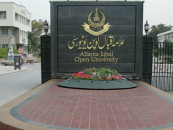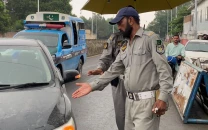Towards an exemplary police force
All police departments must have a two-way channel interaction with the law breakers

This 140-year-old Irish colonial legacy chiefly focuses on controlling the locals and maintaining the colonial rule. The question arises, isn’t it too archaic for us to still be adhering to it?
We are all aware of the current semi-war condition of the country. The local police force is expected to overcome such situations, but it is not trained to perform their duties effectively — and following the module of ‘crowd control,’ isn’t cutting it.
In order to eliminate or curtail crime, networking is an essential strategy that must be mastered before we can take any action. All police departments must have a two-way channel interaction with the law breakers. As witnessed in 1992, the military operation launched by the Pakistan Army against militants did not bear fruit. Although the operation did apprehend a number of gangsters, militants and criminals, it failed to extinguish the networks of such gangs. The military operation also caused the defamation of the army nationwide due to extra judicial killings and hatred among the local populace. As a result, they were unsuccessful to install any long-term security mechanisms that could improve the security system and prevent new militants to infiltrate.
One of the major causes of this failure was that the local police force was not made to get involved in the process of combatting terrorism, although the police officials by default have a better understanding of the geography and the dynamics of the local populace. Police, disguised as locals can also provide a sense of security to the community. They can understand citizens’ daily life problems and act in a manner to resolve. According to the statistics from 2012, Karachi police force has 32,000 police officials, out of which only 20,000 are operational. The rest of 12,000 are non-operational out of which 4,000 are protecting SIU and CPO officials and 8,000 are on VVIP duties. The metropolis has approximately 24.3 million population and 20,000 active police officials are ideally insufficient as it shows one officer serves 1,200 people.
To fix these issues and find resolutions, we need to focus on how to create a goodwill for local police departments, just like we have done for other paramilitary departments. We must regard their valour, which will further augment their morale, making them more loyal towards their duty. Only after implementing such basic requirements can our local police department be considered exemplary.
Published in The Express Tribune, September 8th, 2016.



















COMMENTS
Comments are moderated and generally will be posted if they are on-topic and not abusive.
For more information, please see our Comments FAQ